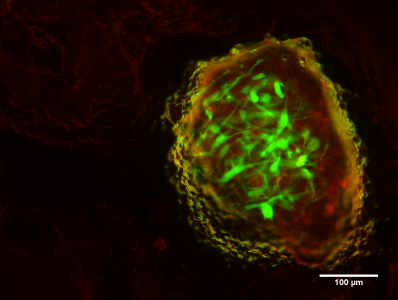
The present scenario in the field of Parkinson’s disease (PD) is grim with no treatments available to halt the progression of the disease. Our group is rigorously working on the development of therapeutics against PD. Using an interdisciplinary approach we have designed smart biomaterials (hydrogels) using small peptides (fragments of proteins) self-assembled into nano-fibres. These hydrogels mimic the natural brain tissue and can be used to transplant human stem cells into brain to facilitate neuron regeneration in neurodegenerative diseases like PD.These hydrogels allow differentiation of stem cells into neurons for replacing the damaged neurons in PD patients’ brains. Being biodegradable, these
hydrogels get naturally metabolised in the brain once their purpose is served. We already have the preliminary proof that these hydrogels do not elicit a high immune response and are within tolerance level both in neuronal cell lines and in animal models. We have also successfully transplanted stem cells into PD animal model with this hydrogel and assessed the fate of those transplanted cells (refer image). The gel substantially improves the survival of the implanted stem cells in the diseased brain environment and promotes their development towards neurons. A key advantage of these hydrogels is that they can be delivered into the brain with minimally invasive surgery. Engineering a complex tissue like that of a brain comes with a lot of challenges and we have miles to go before we can completely mimic the tissue, structurally and functionally. However, development of biocompatible scaffolds that support cells and help in successful cell transplantation gives a strong foundation to build upon, that can eventually make stem cell possible for neurodegenerative diseases such as Parkinson’s and Alzheimer’s.
Prof. Samir K Maji
